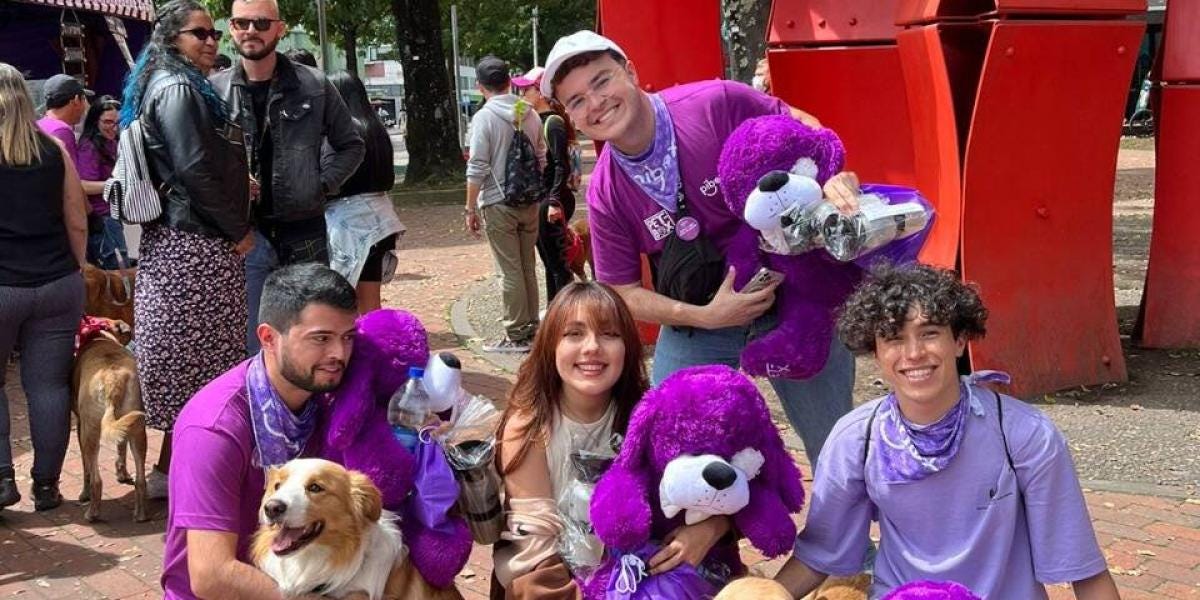In almost no city in Colombia, and probably in Latin America, can you see as many dogs as in Bogotá. Some might say Medellín is similar, but I disagree. Medellín is smaller, so while you may indeed see many dogs there, it's nothing like what happens in Bogotá.
In this chaotic city, people have as many dogs as possible to lead a pleasant life. It's a contrast: the more traffic and chaos, the more dogs. People have found relief in dogs.
The increase in the number of pets in Colombian homes is due to population dynamics, with the average size of families decreasing in recent years. According to the 2005 population census, the average number of people per household was 3.9, but by the 2018 census, this had decreased to 3.1 (preliminary figure).
In Bogotá, according to the 2017 Multipurpose Survey by DANE, households decreased from 3.16 to 2.98 people between 2014 and 2017, making more households willing to welcome animals for additional companionship or as substitutes for children.
This is the agglomeration of pet businesses by zones in Bogota…
The pet economy in Bogotá and Colombia as a whole has experienced significant growth. According to Euromonitor data cited by Noticias RCN, by 2020, the pet industry in Colombia was valued at approximately $1.184 billion, marking a 63.1% increase from the previous five years.
Of this total, $1.065 billion was attributed to pet food and $119 million to pet products and services. In Bogotá, 40% of households reported having a pet according to the DANE multipurpose survey in 2021, highlighting the importance of pets in homes and consequently in the local economy.
Furthermore, the monthly expenditure on pets by Colombian households varies significantly, with 28% of pet owners spending between $190.000 to $374.000 (PESOS) per month, and 17% spending between $560.000 to $745.000 in the same period, as reported by RTVC Noticias.
Bogotá has been recognized as a Pet-Friendly City, noted for its concern for animal welfare, public health, and strengthening the human-animal bond. The capital has launched various initiatives, such as education on responsible pet ownership, the creation of an anti-cruelty squad, and training for various entities in handling animal abuse cases.
These figures and recognitions underscore the economic and social significance of pets in Bogotá and Colombia, reflecting a growing trend towards care and investment in the welfare of companion animals.
While the pet economy in Bogotá and across Colombia has indeed flourished, it has also brought about increased issues regarding cohabitation between pet owners and their neighbors in residential complexes, particularly concerning noise, cleanliness, and unpleasant odors in communal areas.
In response, many administrations are dedicating exclusive areas for pets while updating cohabitation manuals for condominiums to address this emerging reality. The Police Code stipulates that in common areas of condominiums, dogs must be leashed, and potentially dangerous dogs must also be muzzled and have the proper permit.
These private property issues are spilling over into public spaces such as parks and squares, where pets are often let off their leashes to exercise and play. However, not all pet owners are responsible for their pets' behavior, neglecting to pick up after them or leaving waste bags on the sidewalk for sanitation workers to collect. This negligence forces children and other park-goers to endure foul smells and dodge waste.
Despite these challenges, the Bogotá Council has yet to regulate Article 122 of the Police Code, which calls for the regulation of pets' entry into children's play areas within plazas and parks under its jurisdiction.
The issue isn't about banning pets from public spaces but learning to coexist with them respectfully, ensuring that pets' behavior does not interfere with others' enjoyment of green spaces, and vice versa. It's crucial to remember that dogs cannot take responsibility for their actions; it's up to the owners to be accountable.
This problem isn't unique to Bogotá. Some cities worldwide have gone as far as establishing exclusive dog parks, while others less drastically are incorporating pet-friendly features into urban furniture and special waste bins for pet waste.
Ultimately, pet ownership should be considered in urban planning, ensuring multifunctional spaces and developing civic culture strategies that promote enjoyable city living for both citizens and pets.
My theory is that the more chaotic the city, the more people will adopt dogs to make their lives a bit more pleasant.
Bogotá is the world's pet capital, and of that, I'm sure. No other city comes close, and this article is not just informative. I'm not only telling you that you need to learn to deal with your neighbors' dogs if you live in Bogotá, but it could also be a business opportunity. It's up to you.





